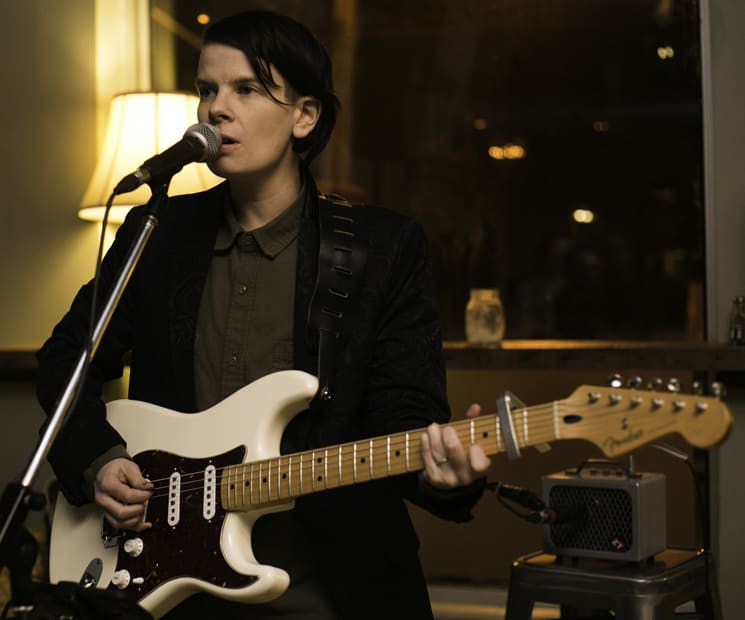The mark of a gifted songwriter is the ability to create the most emotion with the fewest notes. Rae Spoon is a master of restraint, conveying both hope and hurt at once through simple melodies, a skill that led to their Polaris Music Prize nomination for 2013's My Prairie Home.
Spoon showcased their latest album, Armour, to a crowd of no more than 50 people at Pressed Café in Ottawa last night. While the venue was nowhere near capacity, it was sold out by Spoon's design to be an intimate night. And it was — Spoon truly connected with the audience through earnest stories of holding on to optimism despite life's darkness.
On a dim-lit stage bordered by vintage couches and lamps, Spoon began with no more ceremony than their cream-coloured Fender, starting right into "Come On Forest Fire Burn the Disco Down" from their 2008 album Superioryouareinferior. Spoon's pure voice sounds like a trusted friend, and was all they needed to pull the room in.
From there, Spoon played all of Armour, accompanied only by their electric guitar and a backing track featuring their self-produced layers of analog synths, organic and drum machine percussion, and harmonies from the album. "This allows me to bring my imagination to you at a budget price," Spoon quipped.
Joking aside, while some singer-songwriters fumble with adding electronic production elements, Spoon sang so beautifully and earnestly that it grounded the synthesized loops around them. Spoon knew when to layer and when to pull away, ensuring Armour's duelling themes of hope and despair remained at the centre of the night.
"I Hear Them Calling" was the highlight of the show, Spoon's melody expertly weaving between momentum and melancholy all while charming the room to dance to their "Victoria surf music"-toned guitar. On "Try Again at Everything," Spoon's delicate breaking high notes brought humanity to minimal low synth notes. Spoon's shimmering electric organ on "Can't Go Right" betrayed their cynical lyrics, underscoring Armour's opposing forces of healing and hurting.
It was a shame the sound system sometimes crushed together Spoon's intricate layers of organic and electronic production otherwise heard on Armour, combining them into lo-fi cacophony at the worst. During "Written Across the Sky," an energetic call to action inspired by the transgender rights movement, a breaker suddenly failed. Spoon carried on with a smile as the audience's cheers filled what could have been a stark moment of silence. As soon as Spoon revived their soundscape, dancing resumed seamlessly.
Much like Spoon's resolve to look forward on Armour, their wicked sense of humour turned moments like this into valuable points of connection with the audience. Spoon got everyone to playfully sing along, make beast growls to let out their inner demons, and checked in on us mid-song throughout the night.
Among stage-banter stories of partying in the Maritimes, filming a music video with their family, and moving to Victoria, BC, Spoon shared that they grew to love practicing songs in their sunroom for its warmth. So too was Ottawa drawn to Spoon for their incredible light.
Spoon showcased their latest album, Armour, to a crowd of no more than 50 people at Pressed Café in Ottawa last night. While the venue was nowhere near capacity, it was sold out by Spoon's design to be an intimate night. And it was — Spoon truly connected with the audience through earnest stories of holding on to optimism despite life's darkness.
On a dim-lit stage bordered by vintage couches and lamps, Spoon began with no more ceremony than their cream-coloured Fender, starting right into "Come On Forest Fire Burn the Disco Down" from their 2008 album Superioryouareinferior. Spoon's pure voice sounds like a trusted friend, and was all they needed to pull the room in.
From there, Spoon played all of Armour, accompanied only by their electric guitar and a backing track featuring their self-produced layers of analog synths, organic and drum machine percussion, and harmonies from the album. "This allows me to bring my imagination to you at a budget price," Spoon quipped.
Joking aside, while some singer-songwriters fumble with adding electronic production elements, Spoon sang so beautifully and earnestly that it grounded the synthesized loops around them. Spoon knew when to layer and when to pull away, ensuring Armour's duelling themes of hope and despair remained at the centre of the night.
"I Hear Them Calling" was the highlight of the show, Spoon's melody expertly weaving between momentum and melancholy all while charming the room to dance to their "Victoria surf music"-toned guitar. On "Try Again at Everything," Spoon's delicate breaking high notes brought humanity to minimal low synth notes. Spoon's shimmering electric organ on "Can't Go Right" betrayed their cynical lyrics, underscoring Armour's opposing forces of healing and hurting.
It was a shame the sound system sometimes crushed together Spoon's intricate layers of organic and electronic production otherwise heard on Armour, combining them into lo-fi cacophony at the worst. During "Written Across the Sky," an energetic call to action inspired by the transgender rights movement, a breaker suddenly failed. Spoon carried on with a smile as the audience's cheers filled what could have been a stark moment of silence. As soon as Spoon revived their soundscape, dancing resumed seamlessly.
Much like Spoon's resolve to look forward on Armour, their wicked sense of humour turned moments like this into valuable points of connection with the audience. Spoon got everyone to playfully sing along, make beast growls to let out their inner demons, and checked in on us mid-song throughout the night.
Among stage-banter stories of partying in the Maritimes, filming a music video with their family, and moving to Victoria, BC, Spoon shared that they grew to love practicing songs in their sunroom for its warmth. So too was Ottawa drawn to Spoon for their incredible light.
